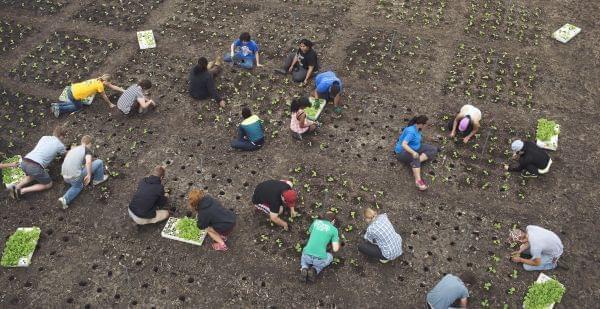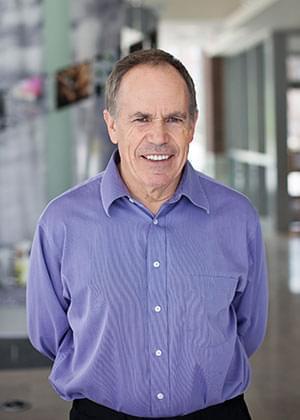U of I Professor Recounts Appearance At UN Climate Summit

Participants in the RIPE project engaged in planting nearly 9,000 seedlings for the 2015 side-by-side field trials at the University of Illinois South Farms. Prof. Stephen Long directs RIPE, which stands for “realizing increased photosynthetic efficiency.” RIPE Project
University of Illinois Professor Stephen Long spoke at the U.N. Climate Summit in Paris about the need to improve agricultural productivity.

Stephen Long is a Gutgesell Endowed University of Illinois Professor of Crop Sciences and Plant Biology. Long was invited to speak to an audience of political leaders, lawmakers, and concerned citizens at the Paris Climate Convention in December.
Long is a professor of crop science and plant biology. He was invited to speak at a public session of the summit, which wrapped up its business on December 12. The summit brought together political leaders from nearly 200 countries, and ended with an agreement for lowering greenhouse gas emissions.
Long talked with Illinois Public Media’s Christine Herman about the goals of his trip, and what he accomplished.
Christine Herman: Professor Long, you were given five minutes to speak to an audience of citizens, lawmakers, and political leaders in Paris. What point were you hoping to drive home in your talk?
Stephen Long: The point I was really making is that we need, quite urgently, to up agricultural productivity on the land we're using, because if you look at the United Nations projections for future food demand, we could be needing as much as 70 percent more primary foodstuffs by 2050.
The developed world really needs to be investing in means to improve productivity on the existing land. Otherwise we could not only be setting up problems for global change, but also possible famines into the future that will impact the poorest in our society.
Christine Herman: So, there’s now a plan—with 195 nations on board—to reduce greenhouse gas emissions. How do you feel about the deal?
Stephen Long: I feel very good about the deal. All the major countries, have signed up to limiting global warming, that's the average temperature of the globe, to two degrees. So that is a very significant commitment. I do think, though, that there has been some underestimation of the impacts of global change on agriculture. And this is going to need to be recognized more.
Christine Herman: How does your work here at Illinois bring us closer to achieving this goal of producing more food on less land, and under increasingly less favorable climate conditions?
If you look at the United Nations projections for future food demand, we could be needing as much as 70 percent more primary foodstuffs by 2050.Stephen Long
Stephen Long: We're looking at new, innovative ways to improve the efficiency of the process of photosynthesis. So this is the process that converts sunlight energy into food. How can we engineer the process to make it more efficient. And we have already identified a couple of changes which look very promising.
Christine Herman: Were there any interesting conversations you had with other people who were at the summit?
Stephen Long: As you can imagine, there was pushback on genetic engineering. And one member of the audience sort of raised their concerns about it. And I sort of compared what we're doing with genetic engineering with conventional breeding, where, if a new disease, for example, develops in a crop, the way we might deal with this conventionally would be to look at wild relatives to try and find one that might have a disease resistance gene. We then cross that with our modern form of that crop to get the gene in, and then we'll then cross it many times with the modern form of that crop until we've roughly got back to that crop.
But in doing that, we've moved our resistance gene, but we've probably moved 200 other genes as well. We have no idea what those genes might be. They might be allergens, they may even be toxins. That's considered safe. If however, we use genetic engineering, we can take that one gene and put it into our crop plant without introducing anything else. And so, I explained this to the audience, and this person actually said, “I never realized that actually in some ways, this could be safer.”
Christine Herman: That must have felt pretty rewarding?
Stephen Long: Yes, it felt very rewarding, because, unfortunately, there has been a lot of misconception around what genetic engineering of crops are. There's no huge magic about this technology. It's certainly something that many scientists could develop and indeed, obviously, along with that, has to go also people who are trained in regulating it, and in explaining this to farmers and the public as well.
Christine Herman: Well thank you so much for sharing that with us, I appreciate it.
Stephen Long: Thank you for this opportunity.
